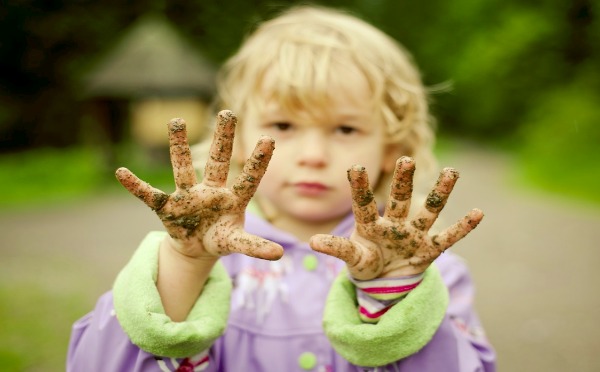We’ve grown up trying to get the dirt off our clothes, our counters and off of everything we can think of. In an effort to fight the germs we’ve learned to fear we may have been doing more harm than good. With an epidemic of allergies, autism, asthma and autoimmune conditions shaping the lives of our children, it is time we rethink our relationship to dirt and the healthy microbes it offers.
Exposure to dirt allows little ones to come into contact with trillions of different microbes that help shape the developing immune system. Children need this introduction to educate their growing immune systems. Growing up in an ultraclean environment deprives the child of this essential immune education because they lack this critical introduction. Researchers exploring the hygiene theory have found that the trillions of microbes that enter the body actually help develop a healthy immune system. We’ve seen that children that grow up on farms have fewer allergies than the urban, city dwelling children. (1) This decrease in allergies is associated with a more diverse population of gut bacteria. Both sets of children, whether growing up in the city or on a farm, had the same amount of gut bacteria but the children raised on a farm had a much more diverse population of gut microbiota. (1) The diversity in gut bacteria is key to a healthy microbiome and dirt provides exactly that.
We need to let our children play in the dirt. We need to let them play in the dirt and not be immediately ushered to the nearest sink. They should be allowed to walk barefoot in the dirt, play in the dirt and encouraged to garden. Let your kids eat dirt. Really. There’s no need and plenty of reasons to leave that organic dirt on fruits or vegetables. Especially with food pulled from your garden with your hands, there is no reason to wash that dirt off. Dirt has actually harbored some of the world’s most powerful antibiotics, including a new antibiotic found in 2015. (2) Good, organic, microbe rich dirt should have a place in children’s lives.
We’ve got to loosen up with our definition of clean. We’ve been told over and over again that cleanliness is the absence of germs and dirt. But germs and dirt are all around us everywhere at all times. The need to sterilize our counters and sanitize our pacifiers have real impacts on our health for the worse. Recent research demonstrated this very thing when researchers found that parents who cleaned their baby’s pacifier by sucking on it rather than washing it had lower rates of allergies in the child due to the immune stimulation from the germs in the parents’ saliva. (3) Harsh chemical cleaners that remove the potentially harmful germs as well as the beneficial germs and leave a ton of chemicals behind are not what we need. We need to be ok with a little more dirt in our lives.
The microbes in soil offer more than just immune education, they also provide key components necessary for mental health. Microbes in soil have been found to activate neurons in the brain to produce serotonin. (4) Serotonin is one of our feel good neurotransmitters and it is the target of SSRIs medications that are common for anxiety and depression like Zoloft, Paxil or Prozac. Not only does this activation increase our serotonin and mood but research shows it also helps increase the learning experience. (5) There is some deeper connection with dirt at work here and that’s exactly why we need our children playing in it.
Now there are some germs we should be wary of. Be sure to wash your hands after handling raw meats, before preparing food and after using the bathroom or changing a diaper. I’d also recommend washing hands during cold and flu season before eating or after social outings like playing at the park or going to the mall. But there’s no need to overdo it, simply use good old fashioned soap and water. Avoid anti-bacterial soaps because they contain toxins like triclosan and work to deplete the bacterial diversity we so desperately need to support health.
It can be hard to undo a lifetime of learning that we must fight germs to stay healthy. Accepting the idea that those same bacteria are responsible for many aspects of our health is important. I cringe a bit on the inside when I see my little one stick a dog toy in her mouth or my son eats something with dirty hands. But it is a just a passing cringe and it is quickly replaced with appreciation for my kids’ explorations and hopes that it shapes their immune system for the better. Get your little ones and go outside today!
– Dr. Catherine Clinton
(1) http://www.jacionline.org/article/S0091-6749(12)00519-2/fulltext
(2) http://www.nature.com/nature/journal/v517/n7535/full/nature14098.html
(3) http://pediatrics.aappublications.org/content/early/2013/04/30/peds.2012-3345
